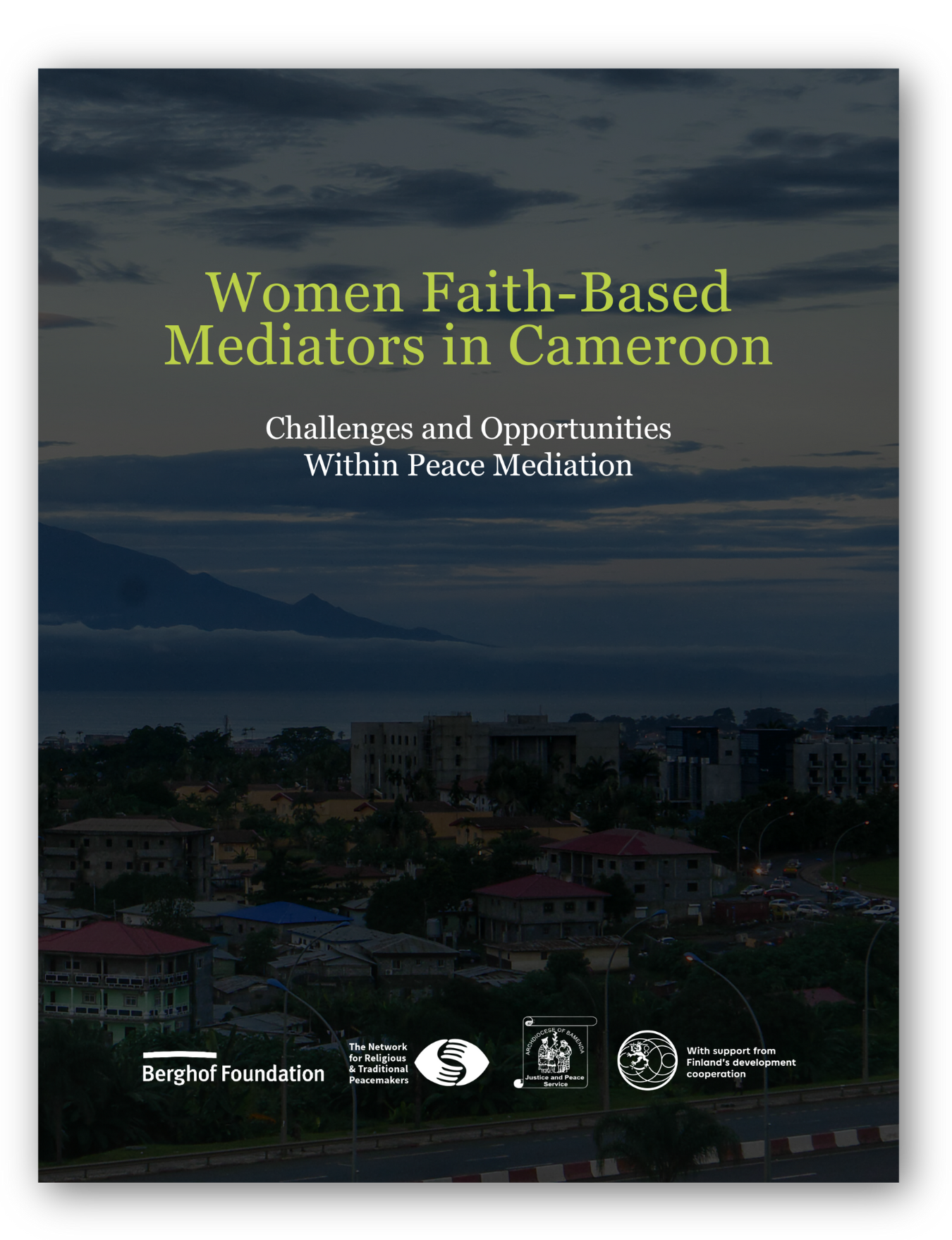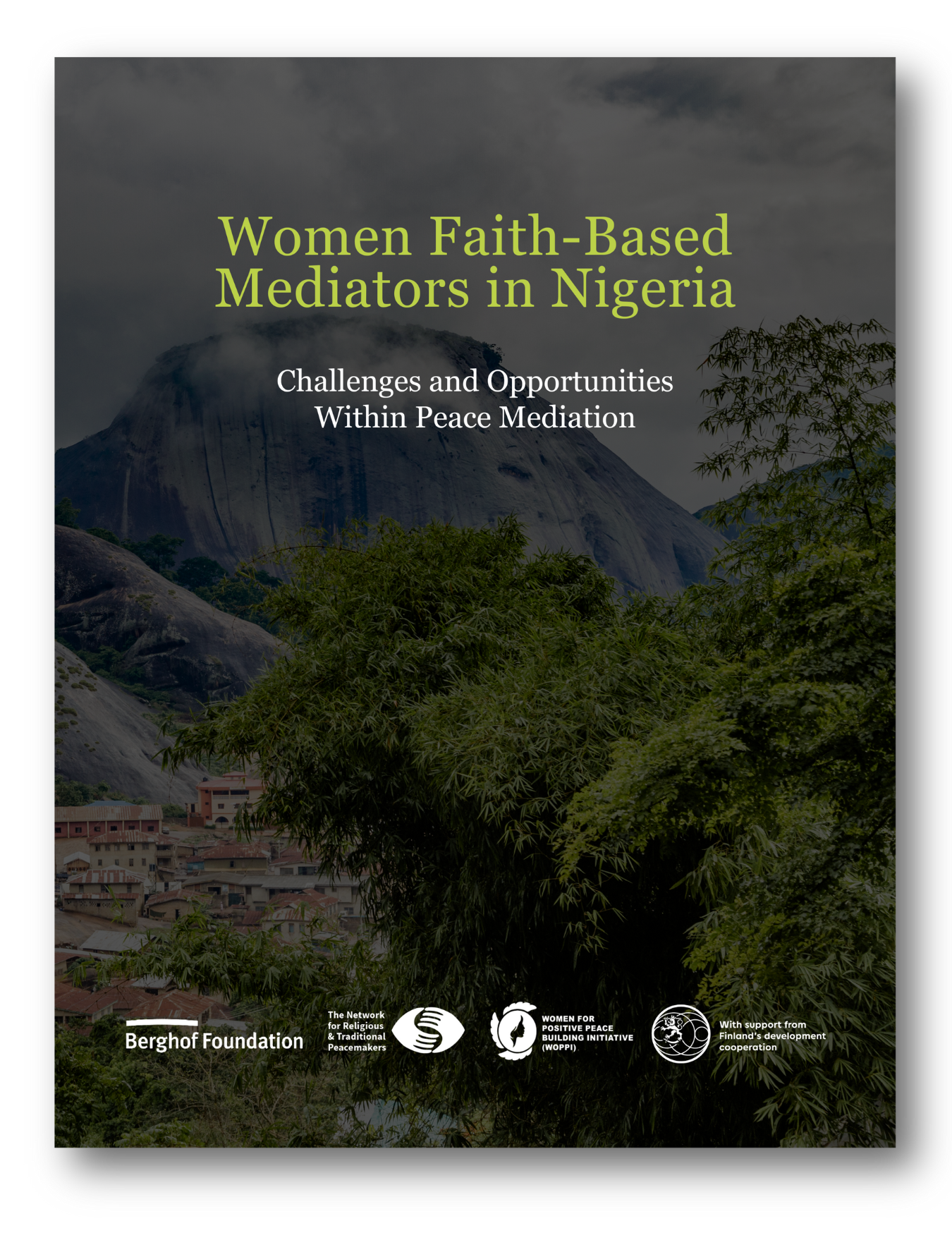Africa Working Group Meeting: The Vital Role of Women Mediators in Conflict Resolution
Africa Working Group | August 2024
In mid-August 2024, the second Africa Working Group meeting of the year convened over 60 participants to explore the pivotal role of women faith-based mediators in peace processes.
The session began with a presentation on the key findings from the Synthesis Paper: Under Crossfire: The Courageous Work of Women Faith-Based Mediators (WFBMs) to Prevent, Mitigate and Resolve Violent Conflicts, developed by the Peacemakers Network and Berghof Foundation. The key findings were presented by Jessica Roland, the Editor of the paper and Senior Specialist on Inclusive Peace for the Peacemakers Network.
The key findings from the paper were discussed by the participants, and some of the main points are listed below:
1. Many WFBMs have difficulty identifying themselves with the term “mediator” or “negotiator” – as they have multiple roles that they play.
2. Almost all WFBMs see themselves as religious and faith-based actors.
3. By virtue of their role as respected traditional and religious leaders in the community, WFBMs get involved to raise topics of very strong concern for the community towards armed groups, military, and government stakeholders.
4. Many of the peace mediation and negotiation efforts emerge out of an immediate need on the local level.
5. Faith and religion are constitutive for the motivation of WFBMs, and it gives them courage, resilience, hope and persistence.
6. The more relevant faith and religion is within a society or community, the more relevant the capability to operate based on faith-based knowledge and references.
7. Despite contextual and individual dynamics, religion as a cultural and societal force has been seen to play a constructive role of opening doors.
8. Being part of a faith-based organization certainly lends more credibility and legitimacy in the eyes of those involved within peace mediation efforts.
9. The potential of WFBMs is not sufficiently utilized due to prevailing patriarchal culture in religious contexts.
10. Communities take WFBMs seriously as they are seen as more neutral.
11. Networks created by WFBMs create added value.
12. In utilizing an inclusive approach, many WFMBs engage and partner with men, including male religious and traditional leaders, to facilitate their entry and outreach.
After reviewing the overall findings of the synthesis paper, contextual cases were presented in Cameroon, Nigeria and Uganda:
Laura Anyola Tufon, Coordinator of the Justice and Peace Commission explained that in Cameroon, women do not necessarily identify as women faith-based mediators, but more broadly as women who work for peace through conflict resolution. Faith serves as a unifying factor amongst a community, and women mediators often gain legitimacy through their faith.
In Cameroon, women play a vital role in mobilizing communities. They are frequently the first responders during conflict and are often included in the interfaith dialogues. Women also engage in advocacy, particularly around women’s rights, and focus on building the capacity of other women.
However, there are many risks and challenges that women face, of which some are very personal. They are at risk for physical harm, such as kidnapping, and the streets are often not safe due to ambushes and intimidation. The work also includes stress and trauma. Women have played a crucial role in Cameroon in providing psycho-social support.
Moreover, the patriarchal culture and environment present additional challenges, including having to negotiate their way into decision making spaces. Further, being recognized and gaining support for their work remains a significant challenge in Cameroon.
Learn more about her work and others in the study, ‘Women Faith-Based Mediators in Cameroon: Challenges and Opportunities within Peace Mediation.’
Nigeria also faces many similar kinds of challenges. Lantana Bako Abdullahi, National Co-Coordinator of the Nigerian Women Mediators explained that the concept of “Women Faith-Based Mediator” was also new to her. In Nigeria, women mediators often rely on their faith background, especially given that approximately half of the over 200 million population is female, with roughly equal numbers of Christians and Muslims, faith significantly influences daily life and conflict resolution. However, faith has also been a source of conflict and violence in the country.
Historically, women have had important roles in the society in Nigeria, particularly within the family. They have been critical in resolving family disputes at the grassroots, track 3 level and in countering harmful narratives, especially during protests. Further, in a society where early and force marriages are common, women faith-based mediators have provided critical psycho-social support to young girls and women. Further, women often facilitate dialogues and mediation and build capacity, often remaining viewed as neutral, non-judgmental, and sympathetic.
Even though the role of women faith-based mediators is recognized, the number of women in the decision-making tables is still critically low, with many setbacks due to patriarchal culture. While the legitimacy and relevance of WFBMs is slowly being recognized and respected by local leaders, getting a seat the table and having women’s voices heard remains a challenge, as almost all faith groups are male dominated. The power-imbalance created by patriarchy severely diminishes the space and opportunities of women and WFBMs.
Bako Abdullahi reflected that faith has eased their work as mediators, as WFBMs come from a faith-based background that provides the experience, guiding principles, skills on how to engage with others, including how negotiate and solve disputes, or provide support to people in need, to name a few. The greatest success for WFBM is when they receive recognition. Faith has opened spaces for them, allowing them to do their work, providing support and recognition from local leaders, and opportunities for networking and collaboration. This support is crucial, as a lot of the conflicts throughout the country are religiously motivated.
It is important to have a balanced team when going to the field, including both Muslim and a Christian member to recognize and address the sensitivities in the beliefs and values. However, like Cameroon, women also face many risks while doing their peace work, including the threat of being kidnapped, or facing other physical risks.
Learn more about her work and others in the study, ‘Women Faith-Based Mediators in Nigeria: Challenges and Opportunities within Peace Mediation.’
Honorable Betty Oyella Bigombe, a senior mediator and peacebuilder and former Minister of State from Uganda underlined that most of the mediation processes are affected by trust deficiencies. Involving WFBMs can help build this trust, as their commitment to their work and peace is known by the community. Trust is the cornerstone of any mediation or peace process– trust in the mediators, trust in the process and trust within the parties themselves.
WFBMs are perceived as very emotional, which can work in their favor, but can also impact negatively. WFBMs in some cases refer to the perpetrators as “my sons,” which often provokes moments of soul searching amongst the fighters, making the perpetrators and victims more personal. Honorable Bigombe also raised the issue that young women often are responsible for caring for their families, which limits their involvement in the peace processes. Similarly, elderly women may be seen as a group that needs protection, thus being not included in discussions, especially if they get ‘heated.’ Honorable Bigombe also highlighted the importance of changing the mindset of religious groups, ensuring they recognize the positive role women can play within these processes.
The Working Group Meeting highlighted the significant and yet, underutilized role of Women Faith-Based Mediators in peace processes and mediation around the continent. While these women often face unique challenges, they continue to break barriers to ensure their essential involvement in mediation and peacebuilding. The necessity for continued support of these women is critical to continue to foster sustainable peace throughout Africa.
The next Africa Working Group will be held in November, focusing on Youth and Preventing and Countering Violent Extremism. More details will be shared closer to the event.
If you are interested in joining the Africa Working Group, please email Jutta Martens, Programme Coordinator, Sub Saharan Africa, jutta.martens@kua.fi.
About the Women Faith-Based Mediators Studies
From 2022 to 2023, the Network for Religious and Traditional Peacemakers and the Berghof Foundation partnered to study and elevate the challenges and entry points within peace mediation processes faced by WFBMs. Drawing on local research conducted in Colombia, Nigeria, Syria, Cameroon, Iraq, and Kenya, as well as interviews from individuals WFBMs from Israel, Uganda, Yemen, and Aceh, this study unearths the potential of WFBMs for peacemaking, their motivations, their strategies to overcome societal and religious boundaries, their areas of operation and their achievements in the cessation and prevention of violence. Relevant stories and lived experiences of individual WFBMs from different parts of the world build the foundation of the study to understand how the intersectionality of faith, and being a woman or young woman, impacts the effectiveness of peace mediation and negotiation processes at all tracks. More about the project here.
Follow the Network on social


